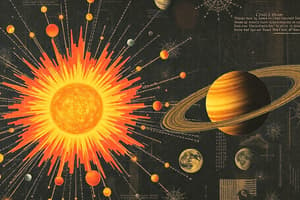Podcast
Questions and Answers
What is the Big Bang Theory?
What is the Big Bang Theory?
A theory that describes the universe as expanding from a tiny, dense point called singularity.
Who proposed the Oscillating Universe theory?
Who proposed the Oscillating Universe theory?
Albert Einstein
Which of the following is NOT one of the four fundamental forces of nature?
Which of the following is NOT one of the four fundamental forces of nature?
- Nuclear Weak Force
- Nuclear Strong Force
- Gravity
- Thermal Energy (correct)
What does the Grand Unified Theory (GUT) combine?
What does the Grand Unified Theory (GUT) combine?
The Inflationary Universe theory suggests that the universe was at rest before its expansion.
The Inflationary Universe theory suggests that the universe was at rest before its expansion.
What is the significance of the Electroweak era?
What is the significance of the Electroweak era?
Genesis describes that God created the universe in __ days.
Genesis describes that God created the universe in __ days.
Match the traditional theories with their descriptions:
Match the traditional theories with their descriptions:
Flashcards are hidden until you start studying
Study Notes
Origin of the Universe
- Big Bang Theory: Proposed by Georges Lemaitre. The universe started from a singularity and is continuously expanding. Initially composed solely of energy, it later produced matter and elements.
- Energy Production: Heavier elements like copper, gold, and uranium were synthesized through the energy generated by the continuous creation and bursting of stars.
Modern Theories
- Plank Era: The universe's earliest stage post-Big Bang, where four fundamental forces were unified into a "super force."
- Four Fundamental Forces:
- Gravity
- Nuclear Weak Force
- Nuclear Strong Force
- Electromagnetic Force
- Four Fundamental Forces:
- Grand Unified Theory (GUT): Focuses on the separation of the "super force" into gravity and the three other forces during the universe's cooling phase.
- Oscillating Universe Theory: A modification of the Big Bang, proposed by Albert Einstein. It suggests that the universe expands, then reverses to undergo a Big Crunch, repeating indefinitely.
- Steady State Theory: Proposed by Fred Hoyle, Thomas Gold, and Hermann Bondi. Argues that the universe expands while maintaining a constant average density, continually creating matter.
- Inflationary Universe Theory: Introduced by Alan Guth, explaining a rapid exponential expansion of the universe in its early stages from a vacuum-like state.
Traditional Theories
- Genesis (Biblical): Describes the universe's creation in six days by God.
- Rigveda (Hinduism): Introduces the concept of the Cosmic Egg or Brahmanda, where Brahman (the creator god) breaks the egg to create the universe.
- Primordial Universe (Greek): Philosopher Anaxagoras theorized that the cosmos began as a chaotic mixture of fundamental elements called "seeds" or "homoiomeries," infinitely divisible and existing in fragments.
Particle Era
- During this era, the four fundamental forces became distinct and ordinary particles began to form.
- As the universe cooled, quarks combined in groups of three to create protons and neutrons, marking a significant transitional phase in cosmic evolution.
Studying That Suits You
Use AI to generate personalized quizzes and flashcards to suit your learning preferences.




